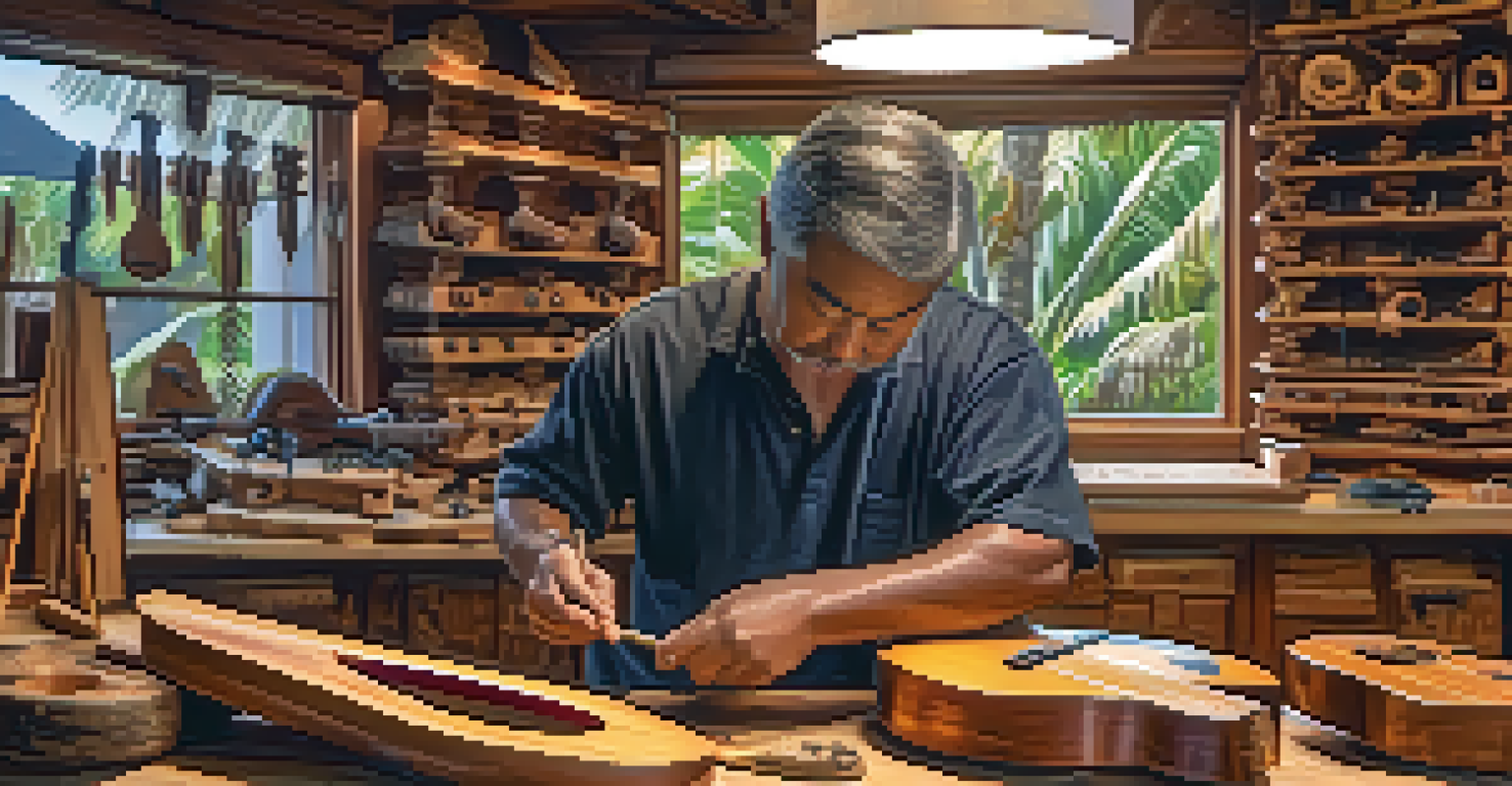The Impact of Hawaiian Culture on Ukulele Design

Hawaiian Roots: The Birth of the Ukulele
The ukulele, a small guitar-like instrument, has deep roots in Hawaiian culture. It was introduced to Hawaii in the late 19th century by Portuguese immigrants, who brought with them the braguinha, a small string instrument. Over time, locals embraced this instrument, adding their own unique flair and creativity, which led to the development of what we now know as the ukulele.
Music is the universal language of mankind.
Hawaiians quickly adopted the ukulele, making it an essential part of their musical expression. The instrument became a symbol of joy and celebration, often played during gatherings and festivities. Through its music, the ukulele helped share Hawaiian stories, traditions, and values, cementing its place in the heart of the culture.
Today, the ukulele is celebrated not just in Hawaii but around the world. Its cheerful sound and accessible design invite musicians of all levels to join in, making it a powerful tool for cultural exchange and appreciation. This global popularity underscores the significant impact of Hawaiian culture on the ukulele's evolution.
Materials Matter: Traditional Hawaiian Woods
One of the most significant aspects of ukulele design is the choice of materials, particularly the woods used in their construction. Traditional Hawaiian ukuleles often feature native woods like koa, which is prized for its beauty and tonal qualities. Koa wood not only gives the instrument a stunning appearance but also contributes to its warm, rich sound that musicians love.

The process of sourcing and working with these woods is steeped in Hawaiian tradition. Craftsmen often hand-select each piece of wood, considering its grain and resonance. This attention to detail reflects a deep respect for the natural environment and a commitment to preserving local resources, which is a core value in Hawaiian culture.
Ukulele's Hawaiian Heritage
The ukulele, embraced by Hawaiians, symbolizes joy and cultural expression, evolving from Portuguese roots into a beloved instrument.
As modern ukulele makers continue to explore sustainable practices, many are now blending traditional methods with innovative techniques. This evolution ensures that the essence of Hawaiian craftsmanship remains while adapting to contemporary demands. Ultimately, the materials used tell a story of connection to the land and the culture that birthed this beloved instrument.
Design Elements: Influences from Nature and Culture
The design of the ukulele is not just about its physical shape; it is also a reflection of Hawaiian culture and nature. Many ukuleles feature intricate inlays and carvings that depict elements of Hawaiian life, such as flowers, waves, and traditional symbols. These artistic details serve as a celebration of the island's beauty and cultural heritage.
The ukulele is a small instrument that can bring people together in ways that are profound.
Craftsmen often draw inspiration from the surrounding landscape, integrating local motifs that resonate with the spirit of Aloha. This connection to nature is vital in Hawaiian culture, where the environment is seen as a living entity deserving of respect. Each design choice carries meaning, reminding players of their roots and the stories behind the instrument.
As ukulele design continues to evolve, modern artisans are experimenting with new shapes and styles while still paying homage to traditional aesthetics. This blend of old and new keeps the spirit of Hawaiian culture alive, ensuring that each ukulele is not just an instrument but also a piece of art filled with history and significance.
The Role of Music in Hawaiian Culture
Music holds a special place in Hawaiian culture, serving as a means of storytelling and community bonding. The ukulele, with its lighthearted sound, plays a pivotal role in this musical tradition, often accompanying hula dances and other cultural performances. Through music, Hawaiians pass down their history, values, and traditions to future generations.
Ukulele music is characterized by its joyful melodies and rhythmic strumming, which can lift spirits and create a sense of belonging. Whether played at a family gathering or a public festival, the ukulele brings people together, fostering a sense of unity and shared experience. This communal aspect of music is central to Hawaiian culture, reflecting the island's values of connection and harmony.
Cultural Preservation Through Music
Education and community programs that incorporate ukulele lessons are vital for teaching Hawaiian heritage and preserving cultural identity.
Moreover, the popularity of ukulele music has transcended borders, allowing Hawaiian culture to influence global music scenes. As artists from various backgrounds adopt the ukulele, they infuse it with their own styles, creating a rich tapestry of sounds that pays tribute to its Hawaiian origins. In this way, the ukulele serves as a bridge, connecting cultures and celebrating diversity through music.
Cultural Preservation through Ukulele Education
Education plays a crucial role in preserving Hawaiian culture, and the ukulele is often at the forefront of this effort. Many schools and community programs incorporate ukulele lessons as a way to teach students about their heritage and musical traditions. By learning to play the ukulele, young people connect with their roots and gain a deeper appreciation for their cultural identity.
These educational programs not only focus on music skills but also emphasize the stories and meanings behind the songs. Students learn about traditional Hawaiian values, language, and history, all woven into the fabric of the music they play. This holistic approach ensures that the cultural significance of the ukulele is passed down alongside musical techniques.
As more people embrace the ukulele, the demand for educational resources continues to grow. Workshops, online classes, and community gatherings provide opportunities for individuals of all ages to learn and share their love for the instrument. In this way, the ukulele becomes a vehicle for cultural preservation, keeping Hawaiian traditions alive in a modern world.
Famous Ukulele Players: Icons of Hawaiian Music
Throughout history, several musicians have elevated the ukulele to iconic status, bringing Hawaiian music to a global audience. Artists like Israel Kamakawiwo'ole and Jake Shimabukuro have showcased the instrument's versatility and emotional depth, captivating listeners with their unique playing styles. Their contributions have not only popularized the ukulele but have also highlighted its cultural significance.
These musicians often blend traditional Hawaiian music with contemporary genres, allowing the ukulele to transcend its cultural boundaries. By incorporating elements of jazz, pop, and rock, they have introduced the ukulele to new audiences while honoring its roots. This fusion of styles exemplifies the adaptive nature of Hawaiian culture, which values innovation while respecting tradition.
Global Ukulele Community Growth
The ukulele's global popularity has fostered a diverse community that enhances cultural exchange and appreciation for Hawaiian music.
Moreover, the recognition of these prominent ukulele players has inspired a new generation of musicians to explore the instrument. As more people pick up the ukulele, they contribute to its evolving narrative, ensuring that Hawaiian culture continues to thrive and inspire creativity worldwide. The legacy of these artists serves as a reminder of the ukulele's enduring impact on music and culture.
The Global Ukulele Community: A Cultural Exchange
In recent years, the ukulele has gained immense popularity across the globe, creating a vibrant community of enthusiasts and players from diverse backgrounds. This international interest has fostered a cultural exchange that enriches the understanding of Hawaiian music and traditions. As people share their experiences and interpretations, the ukulele becomes a canvas for creativity that transcends borders.
Online platforms and social media have played a significant role in connecting ukulele players worldwide. From YouTube tutorials to virtual jam sessions, musicians can share their skills, collaborate, and celebrate their love for the instrument. This sense of community not only nurtures friendships but also promotes cultural appreciation, allowing players to explore Hawaiian music while bringing their own influences into the mix.

As the ukulele community continues to grow, it serves as a reminder of the universal language of music. Through its cheerful melodies and inviting nature, the ukulele unites people, promoting understanding and respect for different cultures. In this way, Hawaiian culture lives on, inspiring creativity and connection in an ever-evolving world.